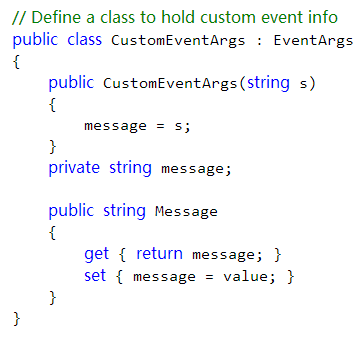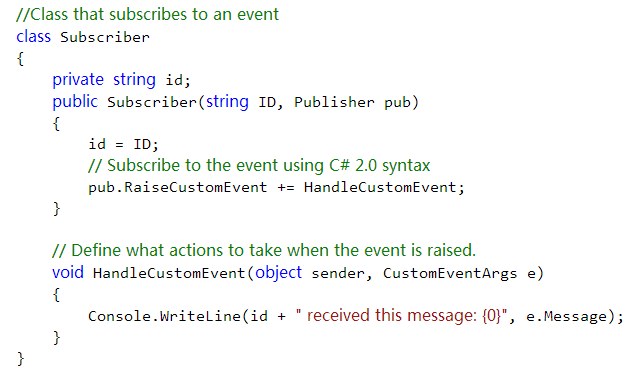事件浅析
委托、事件与Observer设计模式
范例说明
上面的例子已不足以再进行下面的讲解了,我们来看一个新的范例,因为之前已经介绍了很多的内容,所以本节的进度会稍微快一些:
假设我们有个高档的热水器,我们给它通上电,当水温超过95度的时候:1、扬声器会开始发出语音,告诉你水的温度;2、液晶屏也会改变水温的显示,来提示水已经快烧开了。
现在我们需要写个程序来模拟这个烧水的过程,我们将定义一个类来代表热水器,我们管它叫:Heater,它有代表水温的字段,叫做temperature;当然,还有必不可少的给水加热方法BoilWater(),一个发出语音警报的方法MakeAlert(),一个显示水温的方法,ShowMsg()。
namespace Delegate {
class Heater {
private int temperature; // 水温
// 烧水
public void BoilWater() {
for (int i = 0; i <= 100; i++) {
temperature = i;
if (temperature > 95) {
MakeAlert(temperature);
ShowMsg(temperature);
}
}
}
// 发出语音警报
private void MakeAlert(int param) {
Console.WriteLine("Alarm:嘀嘀嘀,水已经 {0} 度了:" , param);
}
// 显示水温
private void ShowMsg(int param) {
Console.WriteLine("Display:水快开了,当前温度:{0}度。" , param);
}
}
class Program {
static void Main() {
Heater ht = new Heater();
ht.BoilWater();
}
}
}
Observer设计模式简介
上面的例子显然能完成我们之前描述的工作,但是却并不够好。现在假设热水器由三部分组成:热水器、警报器、显示器,它们来自于不同厂商并进行了组装。那么,应该是热水器仅仅负责烧水,它不能发出警报也不能显示水温;在水烧开时由警报器发出警报、显示器显示提示和水温。
这时候,上面的例子就应该变成这个样子:
// 热水器
public class Heater {
private int temperature;
// 烧水
private void BoilWater() {
for (int i = 0; i <= 100; i++) {
temperature = i;
}
}
}
// 警报器
public class Alarm{
private void MakeAlert(int param) {
Console.WriteLine("Alarm:嘀嘀嘀,水已经 {0} 度了:" , param);
}
}
// 显示器
public class Display{
private void ShowMsg(int param) {
Console.WriteLine("Display:水已烧开,当前温度:{0}度。" , param);
}
}
这里就出现了一个问题:如何在水烧开的时候通知报警器和显示器?在继续进行之前,我们先了解一下Observer设计模式,Observer设计模式中主要包括如下两类对象:
- Subject:监视对象,它往往包含着其他对象所感兴趣的内容。在本范例中,热水器就是一个监视对象,它包含的其他对象所感兴趣的内容,就是temprature字段,当这个字段的值快到100时,会不断把数据发给监视它的对象。
- Observer:监视者,它监视Subject,当Subject中的某件事发生的时候,会告知Observer,而Observer则会采取相应的行动。在本范例中,Observer有警报器和显示器,它们采取的行动分别是发出警报和显示水温。
在本例中,事情发生的顺序应该是这样的:
- 警报器和显示器告诉热水器,它对它的温度比较感兴趣(注册)。
- 热水器知道后保留对警报器和显示器的引用。
- 热水器进行烧水这一动作,当水温超过95度时,通过对警报器和显示器的引用,自动调用警报器的MakeAlert()方法、显示器的ShowMsg()方法。
类似这样的例子是很多的,GOF对它进行了抽象,称为Observer设计模式:Observer设计模式是为了定义对象间的一种一对多的依赖关系,以便于当一个对象的状态改变时,其他依赖于它的对象会被自动告知并更新。Observer模式是一种松耦合的设计模式。
实现范例的Observer设计模式
我们之前已经对委托和事件介绍很多了,现在写代码应该很容易了,现在在这里直接给出代码,并在注释中加以说明。
using System;
using System.Collections.Generic;
using System.Text;
namespace Delegate {
// 热水器
public class Heater {
private int temperature;
public delegate void BoilHandler(int param); //声明委托
public event BoilHandler BoilEvent; //声明事件
// 烧水
public void BoilWater() {
for (int i = 0; i <= 100; i++) {
temperature = i;
if (temperature > 95) {
if (BoilEvent != null) { //如果有对象注册
BoilEvent(temperature); //调用所有注册对象的方法
}
}
}
}
}
// 警报器
public class Alarm {
public void MakeAlert(int param) {
Console.WriteLine("Alarm:嘀嘀嘀,水已经 {0} 度了:", param);
}
}
// 显示器
public class Display {
public static void ShowMsg(int param) { //静态方法
Console.WriteLine("Display:水快烧开了,当前温度:{0}度。", param);
}
}
class Program {
static void Main() {
Heater heater = new Heater();
Alarm alarm = new Alarm();
heater.BoilEvent += alarm.MakeAlert; //注册方法
heater.BoilEvent += (new Alarm()).MakeAlert; //给匿名对象注册方法
heater.BoilEvent += Display.ShowMsg; //注册静态方法
heater.BoilWater(); //烧水,会自动调用注册过对象的方法
}
}
}
输出为:
Alarm:嘀嘀嘀,水已经 96 度了:
Alarm:嘀嘀嘀,水已经 96 度了:
Display:水快烧开了,当前温度:96度。
// 省略...
事件新版:
using System;
using System.Collections.Generic;
using System.Linq;
using System.Text;
namespace ConsoleApplication3
{
class Program
{
public class PlayEventArgs : EventArgs
{
private string filename;
public PlayEventArgs(string filename)
{
this.filename = filename;
}
public string Filename
{
get { return filename; }
}
}
public class PlayerUI
{
public event EventHandler<PlayEventArgs> playEvent;
public void UserPressedPlay()
{
OnPlay();
}
protected virtual void OnPlay()
{
EventHandler<PlayEventArgs> localHandler = playEvent;
if (localHandler != null)
{
localHandler(this, new PlayEventArgs("somefirl.wav"));
}
}
}
public class CorPlayer
{
private PlayerUI ui;
public CorPlayer()
{
ui=new PlayerUI();
ui.playEvent += this.PlaySomething;
}
public void PlaySomething(object souce, PlayEventArgs args)
{
Console.WriteLine("事假输出");
}
}
static void Main(string[] args)
{
CorPlayer player = new CorPlayer();
Console.ReadKey();
}
}
}
解析EventHandler
【event & EventHandler】
在老C#中EventHandler指的是一个需要定义一个delegate,这个delegate是回调的规范。例如:
public delegate void CustomEventHandler(object sender, CustomEventArgs a);
在新C#中,内置了一个EventHandler<T>范型。
event是一个关键字,用event关键字可以定义一个event对象。
public event CustomEventHandler RaiseCustomEvent;
在新C#下,可以像下面这么写:
public event EventHandler<CustomEventArgs> RaiseCustomEvent;
最后,参数要从EventArgs类继承。
【实战Demo】
1、定义EventArgs类的子类,以实现自己的事件类型。
2、定义Publisher类,此类中需包含一个event成员变量。
3、Subscriber中实现了向Publisher注册,以及实现一个EventHanlder所商定的方法。
委托的匿名方法:
原代码:
using System;
using System.Collections.Generic;
using System.Linq;
using System.Text;
namespace ConsoleApplication3
{
class Program
{
public delegate int ProcDtrategy(int x);
public class Process
{
private ProcDtrategy strategy;
public ProcDtrategy Strategy
{
set { strategy = value; }
}
public int[] Process(int[] array)
{
int[] result = new int[array.Length];
for (int i = 0; i < array.Length; i++)
{
result[i] = strategy(array[i]);
}
return result;
}
}
public class EntryPoint
{
public static int MultiplyBy2(int x)
{
return x * 2;
}
public static int Mul1(int x)
{
return x * 3;
}
public static void PrintArray(int[] array)
{
for (int i = 0; i < array.Length; ++i)
{
Console.WriteLine("{0}", array[i]);
}
}
}
static void Main(string[] args)
{
int[] integers = new int[] { 1, 2, 3, 4 };
Process proc = new Process();
proc.Strategy = new ProcDtrategy(EntryPoint.MultiplyBy2);
}
}
}
使用匿名方法后的代码
using System;
using System.Collections.Generic;
using System.Linq;
using System.Text;
namespace ConsoleApplication3
{
class Program
{
public delegate int ProcDtrategy(int x);
public class Process
{
private ProcDtrategy strategy;
public ProcDtrategy Strategy
{
set { strategy = value; }
}
public int[] Process(int[] array)
{
int[] result = new int[array.Length];
for (int i = 0; i < array.Length; i++)
{
result[i] = strategy(array[i]);
}
return result;
}
}
public class EntryPoint
{
public static int MultiplyBy2(int x)
{
return x * 2;
}
public static int Mul1(int x)
{
return x * 3;
}
public static void PrintArray(int[] array)
{
for (int i = 0; i < array.Length; ++i)
{
Console.WriteLine("{0}", array[i]);
}
}
}
static void Main(string[] args)
{
int[] integers = new int[] { 1, 2, 3, 4 };
Process proc = new Process();
proc.Strategy = delegate(int x) { return 3 * x; };
}
}
}



